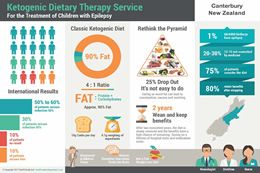Ketogenic Diet Therapy & Epilepsy
The Ketogenic Diet has been studied and used for over one hundred years in the treatment of epilepsy.
Refractory or intractable epilepsy is defined as epilepsy that cannot be controlled through the use of anti-epilepsy medication. This is where Keto really comes into its’ own. The term refractory is typically used when two drugs have been tried, and shown to be ineffective. 30% of people with epilepsy will have refractory epilepsy.
The reason we refer to two or more types of drugs is that 50% of people should have control with the first drug, if the first drug doesn’t work, the chance of the second drug working drops to about 11%. If the first and second drugs don’t work, then the chance of the third drug working drops to about 3%.
Combinations of drugs are selected not just for effectiveness, but also to control the negative side effects of the seizures and the drugs themselves. Traditionally most of the research around Keto Diet Therapy is around children. Simply because this is when refractory epilepsy tends to appear due to various types of epilepsy or syndromes etc manifesting in childhood. More recent studies (Helen Cross June 2017) have resulted in practice guidelines for GPs to help give them confidence in treating refractory epilepsy in adults using the Modified Atkins Diet (a form of Ketogenic Diet). Ketogenic Diet Therapy for adults is a growing area worldwide.
Ketogenic Dietary Therapy
It is not a fad weight loss diet. This is why I refer to Ketogenic Dietary ‘Therapy’.
A Ketogenic Diet is any diet that mimics a starvation state in the body, where the body starts to use fat as a source of fuel. There are many Keto diets out there that can trick the body into the starvation phase. Ketogenic Dietary Therapy is evidence based, specifically calculated dietary treatment to switch your body into starvation state and create ketones in the body, and most of the research generated supports it as a treatment for epilepsy.
The typically has up to 90% fat content, restricted protein and minimal carbohydrates.
The diet typically has up to 90% fat content, restricted protein and minimal carbohydrates. Whereas the fad weight loss diets have 50-60% fat, low carbohydrates and no restriction on protein.
